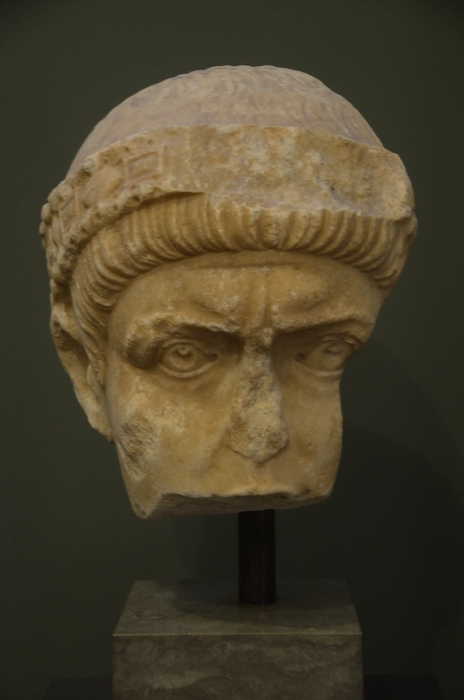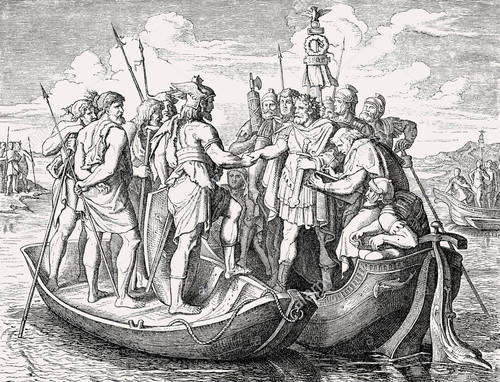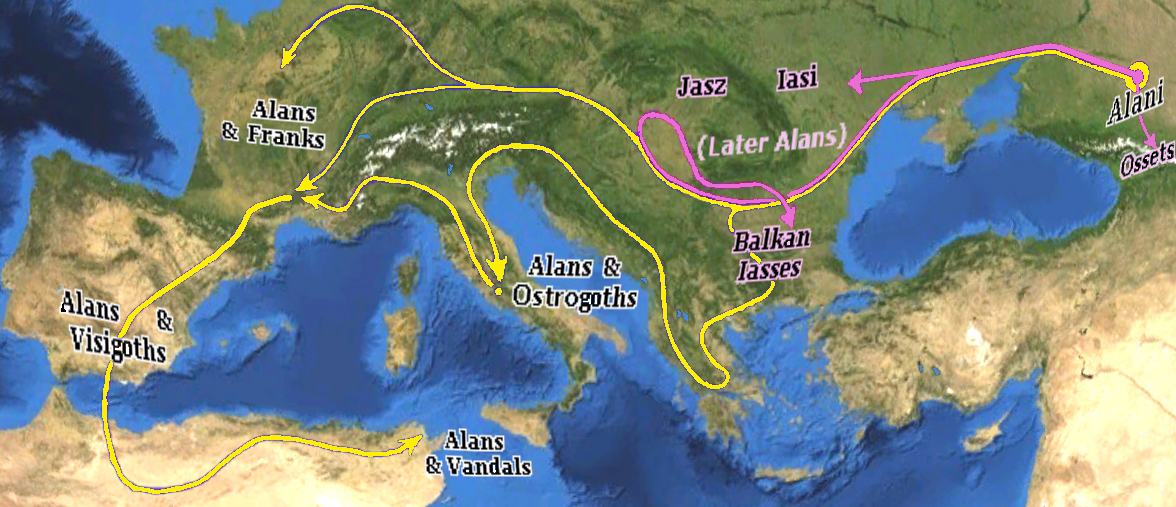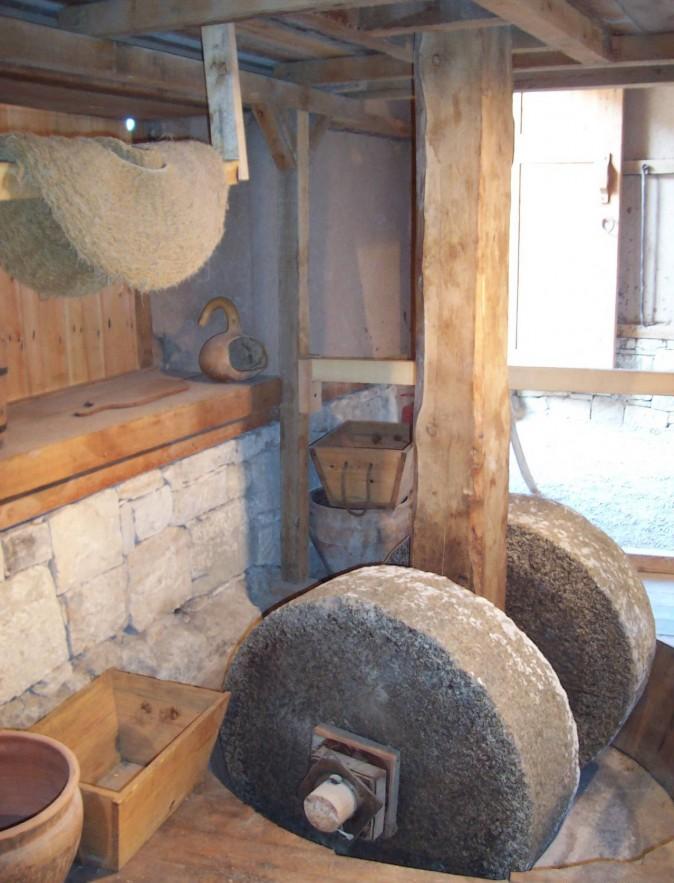|
370
__NOTOC__ Year 370 ( CCCLXX) was a common year starting on Friday (link will display the full calendar) of the Julian calendar. At the time, it was known as the Year of the Consulship of Augustus and Valens (or, less frequently, year 1123 ''Ab urbe condita''). The denomination 370 for this year has been used since the early medieval period, when the Anno Domini calendar era became the prevalent method in Europe for naming years. Events By place Roman Empire * Germanic Invasions: The German peoples surround the north borders of the Roman Empire, while the Huns are destroying everything in their path--villages, cities, even empires. * A law of Valentinian I and Valens bans marriages between Romans and barbarians under penalty of death. * An edict issued by Valentinian I and Valens bans the importation of wine and olive oil from areas controlled by the barbarians. Europe * The Huns migrate westward from the Volga into Europe, and subjugate the Alans and the ... [...More Info...] [...Related Items...] OR: [Wikipedia] [Google] [Baidu] |
Former Yan
The Former Yan (; 337–370) was a dynastic state ruled by the Xianbei during the era of Sixteen Kingdoms in China. Initially, Murong Huang and his son Murong Jun claimed the Jin dynasty-created title "Prince of Yan," but subsequently, in 352, after seizing most of the former Later Zhao territory, Murong Jun would declare himself emperor, and after that point, the rulers of the Former Yan declared themselves "emperors". History During the winter of 342, the Xianbei of Former Yan, ruled by the Murong clan, attacked and destroyed Goguryeo's capital, Hwando, capturing 50,000 Goguryeo men and women to use as slave labor in addition to taking the queen mother and queen prisoner, and forced King Gogukwon to flee for a while. The Xianbei also devastated Buyeo in 346, accelerating Buyeo migration to the Korean peninsula. Their capital was Yan (Beijing) in 350, then Yecheng in 357, and finally Luoyang in 364. File:MurongPainting.jpg, Painting depicting a Xianbei Murong archer in ... [...More Info...] [...Related Items...] OR: [Wikipedia] [Google] [Baidu] |
Huns
The Huns were a nomadic people who lived in Central Asia, the Caucasus, and Eastern Europe between the 4th and 6th century AD. According to European tradition, they were first reported living east of the Volga River, in an area that was part of Scythia at the time; the Huns' arrival is associated with the migration westward of an Iranian people, the Alans. By 370 AD, the Huns had arrived on the Volga, and by 430, they had established a vast, if short-lived, dominion in Europe, conquering the Goths and many other Germanic peoples living outside of Roman borders and causing many others to flee into Roman territory. The Huns, especially under their King Attila, made frequent and devastating raids into the Eastern Roman Empire. In 451, they invaded the Western Roman province of Gaul, where they fought a combined army of Romans and Visigoths at the Battle of the Catalaunian Fields, and in 452, they invaded Italy. After the death of Attila in 453, the Huns ceased to be a major t ... [...More Info...] [...Related Items...] OR: [Wikipedia] [Google] [Baidu] |
Valens
Valens ( grc-gre, Ουάλης, Ouálēs; 328 – 9 August 378) was Roman emperor from 364 to 378. Following a largely unremarkable military career, he was named co-emperor by his elder brother Valentinian I, who gave him the eastern half of the Roman Empire to rule. In 378, Valens was defeated and killed at the Battle of Adrianople against the invading Goths, which astonished contemporaries and marked the beginning of barbarian encroachment into Roman territory. As emperor, Valens continually faced threats both internal and external. He defeated, after some dithering, the usurper Procopius (usurper), Procopius in 366, and campaigned against the Goths across the Danube in 367 and 369. In the following years, Valens focused on the eastern frontier, where he faced the perennial threat of Sasanian Empire, Persia, particularly in Kingdom of Armenia (antiquity), Armenia, as well as additional conflicts with the Saracens and Isaurians. Domestically, he inaugurated the Aqueduct of ... [...More Info...] [...Related Items...] OR: [Wikipedia] [Google] [Baidu] |
Demophilus Of Constantinople
Demophilus (Δημόφιλος; died 386) was a bishop of Berea and an archbishop of Constantinople from 370 until he was expelled in 380. Biography Born of good family in Thessalonica, he was elected by the Arians to the bishopric of Constantinople. The opinion of the populace, however, were much divided. The orthodox party chose Evagrius for their bishop, and he was ordained by Eustathius, the deposed bishop of Antioch. This was the signal for a furious outburst from the Arians. Both Eustathius and Evagrius were banished by the emperor Valens, and their followers bitterly persecuted. Soon after his accession, Demophilus went to Cyzicus with Dorotheus, or Theodorus, of Heraclea to procure the election of an Arian bishop, which was left vacant since the banishment of Eunomius. Nevertheless, the people of Cyzicus refused to acknowledge them until they had anathematized Aetius, Eunomius, and their followers. They were then permitted to ordain a bishop chosen by the people. T ... [...More Info...] [...Related Items...] OR: [Wikipedia] [Google] [Baidu] |
Romania
Romania ( ; ro, România ) is a country located at the crossroads of Central, Eastern, and Southeastern Europe. It borders Bulgaria to the south, Ukraine to the north, Hungary to the west, Serbia to the southwest, Moldova to the east, and the Black Sea to the southeast. It has a predominantly temperate- continental climate, and an area of , with a population of around 19 million. Romania is the twelfth-largest country in Europe and the sixth-most populous member state of the European Union. Its capital and largest city is Bucharest, followed by Iași, Cluj-Napoca, Timișoara, Constanța, Craiova, Brașov, and Galați. The Danube, Europe's second-longest river, rises in Germany's Black Forest and flows in a southeasterly direction for , before emptying into Romania's Danube Delta. The Carpathian Mountains, which cross Romania from the north to the southwest, include Moldoveanu Peak, at an altitude of . Settlement in what is now Romania began in the Lower Pale ... [...More Info...] [...Related Items...] OR: [Wikipedia] [Google] [Baidu] |
China
China, officially the People's Republic of China (PRC), is a country in East Asia. It is the world's List of countries and dependencies by population, most populous country, with a Population of China, population exceeding 1.4 billion, slightly ahead of India. China spans the equivalent of five time zones and Borders of China, borders fourteen countries by land, the List of countries and territories by land borders, most of any country in the world, tied with Russia. Covering an area of approximately , it is the world's third List of countries and dependencies by area, largest country by total land area. The country consists of 22 provinces of China, provinces, five autonomous regions of China, autonomous regions, four direct-administered municipalities of China, municipalities, and two special administrative regions of China, Special Administrative Regions (Hong Kong and Macau). The national capital is Beijing, and the List of cities in China by population, most populous cit ... [...More Info...] [...Related Items...] OR: [Wikipedia] [Google] [Baidu] |
Basil Of Caesarea
Basil of Caesarea, also called Saint Basil the Great ( grc, Ἅγιος Βασίλειος ὁ Μέγας, ''Hágios Basíleios ho Mégas''; cop, Ⲡⲓⲁⲅⲓⲟⲥ Ⲃⲁⲥⲓⲗⲓⲟⲥ; 330 – January 1 or 2, 379), was a bishop of Caesarea Mazaca in Cappadocia, Asia Minor (modern-day Turkey). He was an influential theologian who supported the Nicene Creed and opposed the heresies of the early Christian church, fighting against both Arianism and the followers of Apollinaris of Laodicea. His ability to balance his theological convictions with his political connections made Basil a powerful advocate for the Nicene position. In addition to his work as a theologian, Basil was known for his care of the poor and underprivileged. Basil established guidelines for monastic life which focus on community life, liturgical prayer, and manual labor. Together with Pachomius, he is remembered as a father of communal monasticism in Eastern Christianity. He is considered a saint ... [...More Info...] [...Related Items...] OR: [Wikipedia] [Google] [Baidu] |
Valentinian I
Valentinian I ( la, Valentinianus; 32117 November 375), sometimes called Valentinian the Great, was Roman emperor from 364 to 375. Upon becoming emperor, he made his brother Valens his co-emperor, giving him rule of the eastern provinces. Valentinian retained the west. During his reign, Valentinian fought successfully against the Alamanni, Quadi, and Sarmatians. Most notable was his victory over the Alamanni in 367 at the Battle of Solicinium. His general Count Theodosius defeated a revolt in Africa and the Great Conspiracy, a coordinated assault on Roman Britain by Picts, Scots, and Saxons. Valentinian was also the last emperor to conduct campaigns across both the Rhine and Danube rivers. Valentinian rebuilt and improved the fortifications along the frontiers, even building fortresses in enemy territory. He founded the Valentinianic dynasty, with his sons Gratian and Valentinian II succeeding him in the western half of the empire. Early life Valentinian was born i ... [...More Info...] [...Related Items...] OR: [Wikipedia] [Google] [Baidu] |
Athanaric
Athanaric or Atanaric ( la, Athanaricus; died 381) was king of several branches of the Thervingian Goths () for at least two decades in the 4th century. Throughout his reign, Athanaric was faced with invasions by the Roman Empire, the Huns and a civil war with Christian rebels. He is considered the first king of the Visigoths, who later settled in Iberia, where they founded the Visigothic Kingdom. Life Athanaric made his first appearance in recorded history in 369, when he engaged in battle with the Roman emperor Valens and ultimately negotiated a favorable peace for his people. During his reign, many Thervingi had converted to Arian Christianity, which Athanaric vehemently opposed, fearing that Christianity would destroy Gothic culture. According to the report of Sozomen, more than 300 Christians were killed in Athanaric's persecution during the 370s. Fritigern, Athanaric's rival, was an Arian and had the favor of Valens, who shared his religious beliefs. In the early 370 ... [...More Info...] [...Related Items...] OR: [Wikipedia] [Google] [Baidu] |
Alans
The Alans (Latin: ''Alani'') were an ancient and medieval Iranian nomadic pastoral people of the North Caucasus – generally regarded as part of the Sarmatians, and possibly related to the Massagetae. Modern historians have connected the Alans with the Central Asian Yancai of Chinese sources and with the Aorsi of Roman sources. Having migrated westwards and becoming dominant among the Sarmatians on the Pontic–Caspian steppe, the Alans are mentioned by Roman sources in the . At that time they had settled the region north of the Black Sea and frequently raided the Parthian Empire and the Caucasian provinces of the Roman Empire. From the Goths broke their power on the Pontic Steppe. Upon the Hunnic defeat of the Goths on the Pontic Steppe around , many of the Alans migrated westwards along with various Germanic tribes. They crossed the Rhine in 406CE along with the Vandals and Suebi, settling in Orléans and Valence. Around 409 CE they joined the Vandals and S ... [...More Info...] [...Related Items...] OR: [Wikipedia] [Google] [Baidu] |
Olive Oil
Olive oil is a liquid fat obtained from olives (the fruit of ''Olea europaea''; family Oleaceae), a traditional tree crop of the Mediterranean Basin, produced by pressing whole olives and extracting the oil. It is commonly used in cooking: for frying foods or as a salad dressing. It can be found in some cosmetics, pharmaceuticals, soaps, and fuels for traditional oil lamps. It also has additional uses in some religions. The olive is one of three core food plants in Mediterranean cuisine; the other two are wheat and grapes. Olive trees have been grown around the Mediterranean since the 8th millennium BC. In 2019–2020, world production of olive oil was . Spain was the largest producer followed by Italy, Tunisia, Greece, Turkey and Morocco. San Marino has by far the largest per capita consumption of olive oil worldwide. The composition of olive oil varies with the cultivar, altitude, time of harvest, and extraction process. It consists mainly of oleic acid (up to 83 ... [...More Info...] [...Related Items...] OR: [Wikipedia] [Google] [Baidu] |
Bishop
A bishop is an ordained clergy member who is entrusted with a position of authority and oversight in a religious institution. In Christianity, bishops are normally responsible for the governance of dioceses. The role or office of bishop is called episcopacy. Organizationally, several Christian denominations utilize ecclesiastical structures that call for the position of bishops, while other denominations have dispensed with this office, seeing it as a symbol of power. Bishops have also exercised political authority. Traditionally, bishops claim apostolic succession, a direct historical lineage dating back to the original Twelve Apostles or Saint Paul. The bishops are by doctrine understood as those who possess the full priesthood given by Jesus Christ, and therefore may ordain other clergy, including other bishops. A person ordained as a deacon, priest (i.e. presbyter), and then bishop is understood to hold the fullness of the ministerial priesthood, given responsibil ... [...More Info...] [...Related Items...] OR: [Wikipedia] [Google] [Baidu] |






